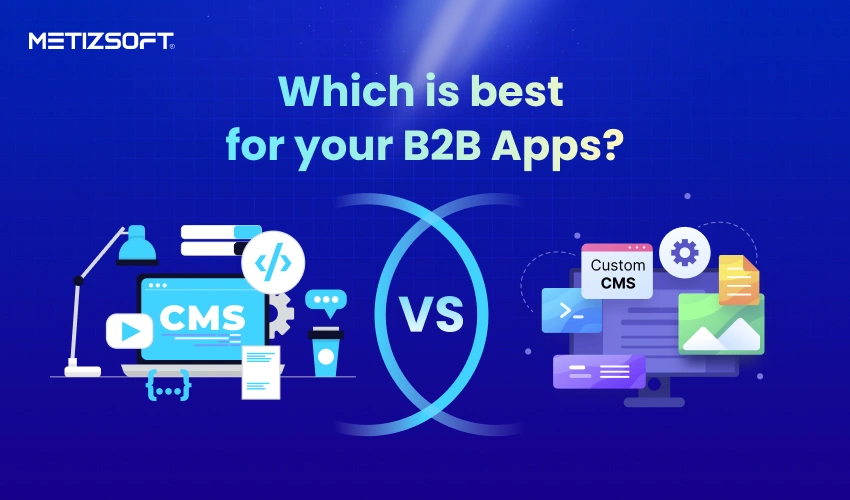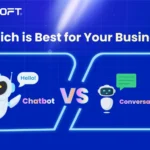
Table of Contents
Summary
If you are building or expanding the B2B application, then choosing the right CMS is not just about the technical details. It’s really about setting your business up for success, enabling it to grow, adapt easily, and seize every opportunity that comes your way. The headless CMS makes multi-channel material distribution, flexibility, and scalability a strong suit. Whereas, Custom CMS brings you workflow, deep integration, and a user experience that is correctly designed for your business needs. Choosing the best between headless CMS and Custom CMS depends entirely on your goals, resources, and how fast you want to move forward.
Introduction
The world of B2B apps has become increasingly complex, demanding far more than simple, one-size-fits-all solutions. Companies in India, the USA and everywhere else increasingly want their apps to work perfectly across devices, handle lots of content, and scale without hiccups. That’s where content management systems (CMS) come in. But with multiple options in front, selecting one becomes a challenging decision. That’s why we have brought you this blog post, where we will explain the real difference between a Headless CMS and a Custom CMS and help you decide which is right for your business.
What is Headless CMS?
A headless CMS is all about separating the content management from how that content is displayed. Forget about themes or templates; here, your backend stores the content, sends it out via APIs, and your developers control how it looks on any platform: website, mobile, or IoT. It’s the modern solution for brands that want flexibility and freedom, perfect for B2B apps that serve multiple audiences.
How it Works
Headless CMS is like a central hub; the content lives in one place, but APIs distribute it anywhere you need. Developers design the front-end for each platform, using any tool or framework they like. This means your team can launch updates, new sites, or mobile apps, all without changing the way content is managed or stored.
What is a Custom CMS?
Custom CMS is exactly what it sounds like: a content management system built and tailored for your business. Need specific workflows, integrations, or unique user permissions? Custom CMS lets you handle all that, creating an interface and experience designed to fit your team and your goals perfectly.
How it Works
With a custom CMS, developers work with you, designing the entire system above the ground. They handle everything from the technical structure to the back end, and how users interact with the front end. If your business has unique requirements, such as complex B2B ordering procedures or multi-level access control, a custom CMS can especially create solutions designed to meet those needs. You will not get stuck with an off-the-shelf template; Instead, you get accurately manufactured equipment for your position.
Main Difference Between Headless CMS and Custom CMS
Below is a quick comparison so you can see the main differences at a glance:
| Features | Headless CMS | Custom CMS |
| Architecture | API-driven, decoupled backend | Fully tailored, monolithic/modular |
| Content Delivery | Multi-platform via API | Platform-specific, deeply customizable |
| Flexibility | Very high, developers choose the frontend | Highest, custom for business needs |
| User Experience | Needs developer/user tool integration | Delivers tailored workflow and UI |
| Scalability & Performance | Built for scale, rapid growth | Depends on custom design and hosting |
Headless CMS excels when you need one content source for many platforms. Custom CMS wins when your workflows are unique, and you want deep integration with proprietary systems.
Architecture: Custom CMS gives you complete control over system design; it’s built around your organization. Headless CMS, meanwhile, creates a clear divide between backend and frontend, letting you shift and scale your delivery formats as your business grows.
Content Delivery: If your audience needs to access your content through mobile apps, kiosks, and web platforms, headless CMS makes this seamless through APIs. Custom CMS, though, can tweak content delivery for any specific environment or proprietary integration your business relies upon.
Flexibility: With a headless CMS, developers get the creative freedom to use any tech stack, which means you can adapt and change direction quickly. Choosing a custom CMS, on the other hand, allows you to fine-tune every detail, from the user experience to the backend automation. This gives you complete ownership and the flexibility to adapt exactly as your business grows and changes.
User Experience: Headless CMS relies on developers to create (or integrate) user-friendly interfaces for editors, while a custom CMS can deliver slick, customized tools that match the way your team actually works. The choice here affects how fast you deploy updates and how easily teams adopt new systems.
Scalability & Performance: Looking to grow fast, add channels, or handle big spikes in traffic? Headless CMS is built for this, optimizing load times and supporting heavy, complex architectures. Custom CMS, on the other hand, scales as far as you’ve designed it to go.
Stat: The headless CMS market size is projected to jump from $973.8 million in 2025 to over $7.1 billion by 2035, a sign that flexibility and scalability matter now more than ever.
Which one to Choose Between Headless CMS and Custom CMS
If your B2B app needs to reach audiences across many channels, handle rapid changes, and scale globally, Headless CMS could be your best bet. But if you’re dealing with niche workflows, complex integrations, or want to create something truly custom for your business, Custom CMS stands out.
Choose Headless CMS When:
- You need to publish content everywhere on the web, mobile, and IoT.
- Your development team is strong and experienced.
- You’re focused on growth, flexibility, and future-proofing your business.
Choose Custom CMS When:
- Your business operations require unique processes or roles.
- Deep integration with existing systems is a must.
- Your team values a tailored experience over speed to market.
Final Thoughts
Both content management systems definitely have their own unique strengths, attract different user groups, and hold their own value in the market! While Headless CMS is looking like the way forward for many businesses (and the numbers prove it), Custom CMS isn’t disappearing anytime soon, especially for those specialized B2B applications where you need that extra level of control.
No matter which path you choose, it’s crucial to work with a CMS development company that really gets your objectives and can build you a solution that grows with you, stays secure, and truly supports your business goals.
FAQS
Is a headless CMS a better fit for mobile-friendly B2B apps?
Absolutely, because its approach is about the first API, which distributes the material smoothly on all types of devices.
How easy is it to migrate from traditional to headless or custom CMS?
With a proper plan from experts, this step can be quite smooth. However, for more complex data migration or difficult integration, you will need some developer assistance.
Which CMS reduces long-term costs for B2B?
Headless CMS often lowers ongoing costs by scaling efficiently, but a Custom CMS could save money if your needs are highly specialized and stable.
What are common pitfalls in custom CMS development?
Projects can run long or go over budget if requirements aren’t clear. Hence, it is always a wise decision to work with experienced CMS developers for the best results.
How do APIs help with content flexibility?
APIs are the backbone of headless CMS, letting you distribute content wherever and however you want.
How do I select the right CMS development company?
When evaluating a partner, look for their experience, a solid portfolio, strong references, and a clear grasp of both the technical and business sides. Metizsoft definitely meets all these criteria!
AboutManthan Bhavsar
Related Posts
20 Top Advantages Of Using WordPress for Your Website
Since its inception in 2003, WordPress is one of the most popular blogging platforms. Wait!! WordPress isn’t just for...
What’s New in Laravel 12? New Starter Kit, Latest Features and Updates
Table of Contents IntroductionLaravel 12 New Starter KitLaravel 12 New Features and UpdatesTop Reasons Why You Should Upgrade...

